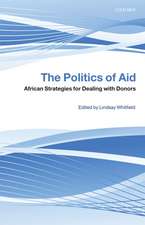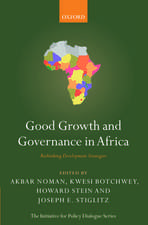Securing Livelihoods: Informal Economy Practices and Institutions
Editat de Isabelle Hillenkamp, Frédéric Lapeyre, Andreia Lemaîtreen Limba Engleză Hardback – 7 noi 2013
Preț: 746.67 lei
Preț vechi: 1071.77 lei
-30% Nou
Puncte Express: 1120
Preț estimativ în valută:
142.89€ • 148.63$ • 117.97£
142.89€ • 148.63$ • 117.97£
Carte tipărită la comandă
Livrare economică 02-08 aprilie
Preluare comenzi: 021 569.72.76
Specificații
ISBN-13: 9780199687015
ISBN-10: 0199687013
Pagini: 320
Ilustrații: 15 Figures, 35 Tables, 4 Boxes
Dimensiuni: 161 x 240 x 23 mm
Greutate: 0.64 kg
Editura: Oxford University Press
Colecția OUP Oxford
Locul publicării:Oxford, United Kingdom
ISBN-10: 0199687013
Pagini: 320
Ilustrații: 15 Figures, 35 Tables, 4 Boxes
Dimensiuni: 161 x 240 x 23 mm
Greutate: 0.64 kg
Editura: Oxford University Press
Colecția OUP Oxford
Locul publicării:Oxford, United Kingdom
Recenzii
The informal and popular economy has often been analysed as a form of barefoot capitalism. The analysis in this book is completely different. Using mainly a Polanyian framework, which recognizes a plurality of principles of economic integration, it presents a new picture of the popular economy and of the role of solidarity within that economy. This different perspective gives a new impulse to conceive of public policy not only in terms of social protection organized by the State, but also in terms of efforts to coordinate formal and informal institutions and practices aimed at enhancing security of livelihoods.
Global economic crisis is adding to the numbers and vulnerabilities of the billion or more people in all parts of the world finding employment and survival in the informal sector. This important collection of 13 case studies from Latin America, Africa, and Asia brings out the human positives as well as the negatives of this process. The book broadens and deepens our understanding of how the informal sector contributes to income, security, and survival, providing some new sources of hope but also new warnings for th se who would simply view these trends with complacency.
The informal economy lies at the heart of the question of social security today. This is because the welfare state is being dismantled in the world's former leading economies and is being built by the BRICS. The issue of how to combine formal and informal institutions in more effective social protection programmes is urgent. This volume, bringing together an impressive range of new scholarship from several regions, breaks new ground in the on-going attempt to coordinate public provision with what people already do for themselves.
This book provides an intelligent and well-structured critical contribution to the knowledge of the popular economy. Inspired by Karl Polanyis hypothesis of the substantive economy, it demonstrates the heuristic value of Polanyis work. The studies, which have a strong empirical basis, focus on the informality, vulnerabilities, and finances of various forms of economic organization and their interaction with their socio-economic environments. The book also advances proposals for public intervention to support local development of the popular economy. This work marks a before and after methodology to investigate a key sector of the economy of peripheral countries.
Global economic crisis is adding to the numbers and vulnerabilities of the billion or more people in all parts of the world finding employment and survival in the informal sector. This important collection of 13 case studies from Latin America, Africa, and Asia brings out the human positives as well as the negatives of this process. The book broadens and deepens our understanding of how the informal sector contributes to income, security, and survival, providing some new sources of hope but also new warnings for th se who would simply view these trends with complacency.
The informal economy lies at the heart of the question of social security today. This is because the welfare state is being dismantled in the world's former leading economies and is being built by the BRICS. The issue of how to combine formal and informal institutions in more effective social protection programmes is urgent. This volume, bringing together an impressive range of new scholarship from several regions, breaks new ground in the on-going attempt to coordinate public provision with what people already do for themselves.
This book provides an intelligent and well-structured critical contribution to the knowledge of the popular economy. Inspired by Karl Polanyis hypothesis of the substantive economy, it demonstrates the heuristic value of Polanyis work. The studies, which have a strong empirical basis, focus on the informality, vulnerabilities, and finances of various forms of economic organization and their interaction with their socio-economic environments. The book also advances proposals for public intervention to support local development of the popular economy. This work marks a before and after methodology to investigate a key sector of the economy of peripheral countries.
Notă biografică
Isabelle Hillenkamp is Research Associate at the Institute of Socio-Economics, University of Geneva, attached to the Swiss National Centre of Competence in Research - LIVES. Her research focuses on the informal and popular economy in Latin America, with particular interest in community and solidarity projects. Before joining the University of Geneva, she was a post-doctoral researcher at the University San Andres of La Paz (Bolivia) and the National Conservatory of Arts and Crafts (CNAM) in Paris. She holds a PhD in Development Studies from the Graduate Institute of International and Development Studies, Geneva. Frédéric Lapeyre is senior employment and informal economy specialist and Manager of the ILO-Technical Cooperation Project for Youth Employment in Katanga (PAEJK), International Labour Organization. He holds a PhD in Development Studies. Previously he was Professor at the Catholic University of Louvain, Belgium, Chairman of the Belgium Post-Graduate School for Development Studies, and Fulbright Post-doctoral Fellow at Brown University (Watson Institute for International Studies). His recent publications include 'The Contributions of the United Nations to Development Theory and Practices' (with R. Jolly, L. Emmerij and D. Ghai) and 'Poverty and Exclusion in a Global World' (with A. Bhalla). Andreia Lemaître is socio-economist and Lecturer in Development Studies at the Catholic University of Louvain, Belgium. She is a member of the Centre for Development Studies (DVLP) and of the Interdisciplinary Research Centre on Work, State and Society (CIRTES). She holds a PhD in political and social sciences from the Catholic University of Louvain and the Conservatoire National des Arts et Métiers, France. She was also a post-doctoral Fellow at the International Institute of Social Studies (ISS) of Erasmus University Rotterdam in The Hague. Her research focuses on popular and solidarity-based economy in the South, mainly in Latin America, and on substantive approaches to the economy.













